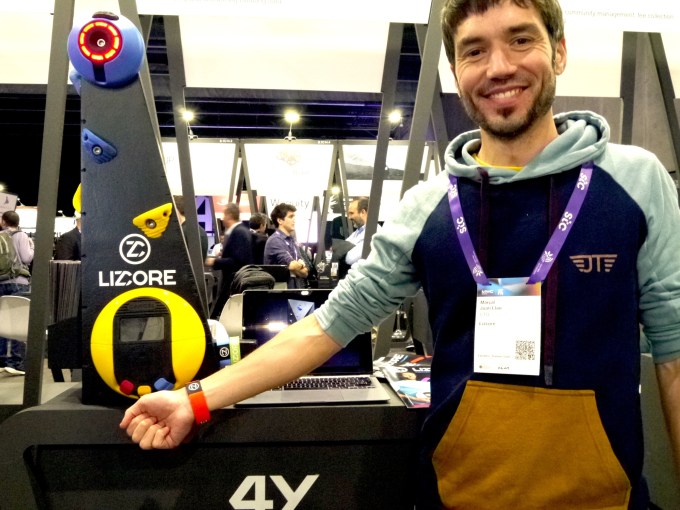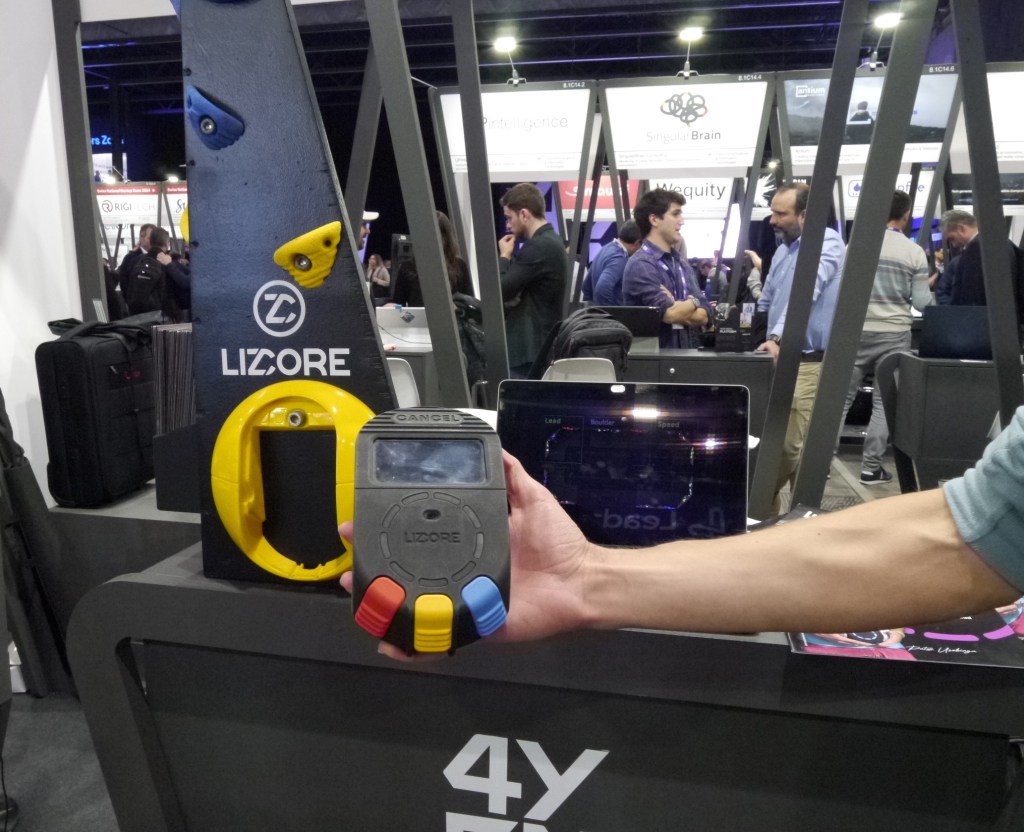Lizcore, a sport tracking startup out of Barcelona, caught our eye on the 4YFN show floor at MWC this week. It’s done what this climber — frankly — thought impossible: Come up with a way to digitize and upgrade the indoor climbing experience that bouldering addicts might actually get on board with.
Bouldering gyms that install its proprietary blend of hardware and software can offer climbers a low friction way to log and track their indoor climbing performance (recording on-sights, red points, how fast problems were scaled, etc.) — while also adding a dash of social gamification (such as the ability to compare stats with friends) — all without having to wear or carry anything more arduous than a slender fabric bracelet or clothes pin.
“Every sport is going from analogue to digital. And climbing was an exception in that sense,” says co-founder and CTO Marçal Juan. “The main issue is because you cannot create an app and expect that climbers use it. So that’s why we need some hardware and that’s why we can get success with that.”
To make use of Lizcore’s progress tracking system, climbers don’t need to climb with their phone or wear anything as annoyingly chunky as a smartwatch (such wearables can just get in the way of climbing and risk being scratched and soiled in a chalky gym). All they need is its lightweight NFC wearable (aka the Lizy bracelet). This minimalist band comes in a range of snazzy colors and is the only bit of hardware required to pair with the startup’s app.
The team is also working on designing an even less intrusive NFC clothes pin, too, to offer a second climber-friendly alternative to persuade boulders this tech won’t weigh them down.
Lizcore’s system requires gyms to buy in and install its smart base units and top-out holds for each boulder problem. One base unit can be shared by up to three routes. Climbers identify themselves at the base unit, using the NFC wearable. Then they make their attempt at the route and the app records either a fail if they don’t reach the top hold or a send and a time for topping out if they make it.
It’s activity and progress tracking with minimal effort so climbers can concentrate on the real work — of training, climbing, sending and repeating. Unsurprisingly the idea for the business came from an ex-pro climber: Co-founder and CEO, Edgar Casanovas.
The wall-mounted Lizcore base unit features a screen so it can display grading info per route. (When we visited the stand the screen wasn’t displaying, owing, we were told, to issues with the conference Wi-Fi.) The buttons on the unit can also be used for climbers to vote on whether or not they agree with the grade after the fact. The unit can also provide them with the ability to vote for a route to be maintained for longer (instead of being reset with a new problem, as bouldering gyms routinely do).
Lizcore says its NFC system could also work for gyms to run ticketing at the entrance/exit, if they don’t already have a system installed, and/or to provide access to fitness classes they may also provide. Another possible use is security — to restrict entrance to particular sections of the gym (such as to prevent kids using certain facilities). And, being NFC, the lightweight devices could support payments, such as at the café or bar gyms typically run. So climbers could even use the minimalist wearable to forget having to bring their own wallets to the gym.

“The possibilities are endless,” suggests Juan. “You can expect that the [gyms which] buy this device want to fully optimise the usage. So if we sell another service, it’s very easy to say, okay, I’m interested. The selling point is that we have a hardware that is needed for climbing. And also, because we can have a lot of services… the CRM, the subscriptions, you can use it for everything.”
The two-sided system is also designed to serve up plenty of data insights for gyms too, providing these businesses with analytics and a more granular overview of climbing activity than if they’re just tracking gymgoers’ comings and goings via an entry/exit gate. Lizcore says the system gives gyms data about quiet versus busy times for different climbing areas and walls. Or even how specific routes are performing (too easy, too hard, etc.) — to help them balance the mix of problems offered.
It also provides a way for gyms to run competitions for users — for example, Juan says they could run prize giveaways for the first or fastest ascent of new boulder problems. Or use the tracked routes to verify if climbers have successfully topped out during open bouldering competitions.
With the app sitting on climbers’ phones it opens up a mobile channel for gyms to more easily reach their core users, say with notifications about offers and promotions. But also to offer members more value: Such as providing info on new routes as soon as they’re set and detailed per-route info.
Gyms often rely on posting to Instagram with these sorts of ‘new routes’ PSAs but, via Lizcore, they could target members with notifications when routes have been put up and provide them with the ability to check out route setting in the app ahead of a visit, to read problems and better plan and prepare their trips to the gym.
More information could also be provided by route setters — such as whether a particular route needs a lot of finger strength, power or dynamic technique.
Normally, in bouldering gyms, the only info climbers get is much more basic: A route grade (or, often, just a route range). Add to that, a route grade may vary depending on the morphology of the individual climber (small vs tall for example) — so Lizcore’s route tracking and voting system could also offer a way for climbers to be served more individualized route grades. (Speaking as a short climber that would really be a data-driven leap forward!)
The November 2022-founded startup is working with a handful of gyms (five around Spain) on early deployments of its system so far. It’s currently looking to raise a seed round to switch into a mass production mode, per Juan, who says they’re focusing on scaling in Spain and Europe initially.
He says they’re also in talks with climbing competition organizations about using their system, which also supports uploading audio route flash descriptions to the app for visually impaired climbers.
Additionally, the team is working on developing safety tech for climbing gyms — such as smart auto belay systems that won’t let a person clip into the carabiner unless they have the necessary credential to use the equipment.































Comment